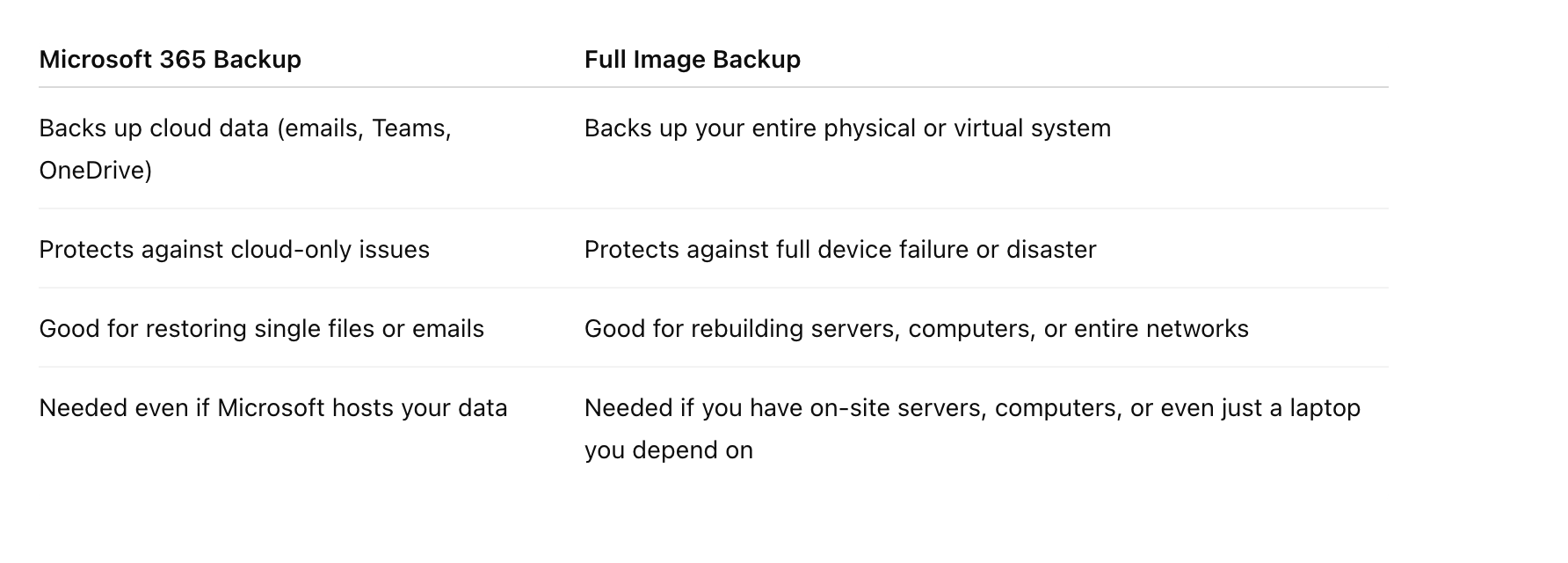Microsoft 365 Backup vs Full Image Backup: Why Omaha Businesses Need Both (and No, They’re Not the Same Thing)
We know that data backups aren’t exactly the most exciting topic. Talking about backups feels a lot like talking about insurance: nobody really cares... until something catches fire.
But if you’re running a business in Omaha — whether you’re a law office, a healthcare provider, a manufacturer, or a landscaping company — understanding the difference between a Microsoft 365 backup and a full image backup can literally save your business.
Let's keep it simple (and a little entertaining).
First: What Is a Microsoft 365 Backup?
You know all those emails, files, Teams chats, and SharePoint documents you use every day?
Microsoft 365 Backup focuses on protecting that cloud data.
It’s like keeping a separate, private copy of your inbox, OneDrive files, and Teams messages just in case Microsoft’s servers get hit by a lightning bolt (or more realistically, a cyberattack, accidental deletion, or corruption).
Important note:
Microsoft DOES NOT automatically protect you from everything.
Sure, they have built-in redundancy to keep their service running, but they are not responsible if you delete a file, someone else deletes an account, or ransomware encrypts your files inside the cloud.
That's why a dedicated Microsoft 365 backup is a must.
Okay, So What Is a Full Image Backup?
Now think bigger: instead of just your emails and files, imagine backing up your entire computer or server — operating system, apps, settings, files, the desktop sticky notes you forgot about — the whole enchilada.
That’s a Full Image Backup.
If your server crashes, your office floods, or a ransomware gang locks your whole system down, a full image backup means you can restore the entire machine, exactly how it was, like flipping back to a saved video game checkpoint.
No reinstalling Windows from scratch. No reconfiguring settings. No tears.
Why You Need Both (And Not Just One)
Some folks think, "Well, we back up Microsoft, we’re good!"
Or, "We have a full server backup, so we don't need cloud backups!"
Cue the dramatic music: Both assumptions are wrong.
Here’s why:
Bottom Line:
If you only have a Microsoft 365 backup, you can still lose your local systems.
If you only have a full image backup, your cloud files are still at risk.
It’s like having home insurance but no car insurance — and trying to drive to work anyway.
Quick Real-World Omaha Examples
Local CPA Office:
Accidentally deleted an important client folder in OneDrive. M365 backup saved the day.
(Otherwise, it was gone forever. Microsoft’s recycle bin isn’t built for real disasters.)Healthcare Clinic:
Server was hit by ransomware.
Full image backup let them restore the entire patient management system in hours — not days or weeks.Manufacturing Company:
Employee account hacked and emails wiped.
Microsoft 365 backup retrieved everything safely, no sweaty board meetings required.
How Omaha Businesses Can Get Proper Backup Protection (Without Losing Sleep)
Here’s your no-nonsense backup plan:
Use a reliable Microsoft 365 backup solution
(Your data deserves better than crossing your fingers.)Set up full image backups for any critical servers or computers
(Especially anything that runs key business apps.)Have a recovery plan that covers both cloud and physical disasters
Because technology fails when you least expect it — usually on Friday afternoon.Work with a local MSP (like [Your Company Name])
We’ll make sure your backups actually work when you need them — not just look pretty in a dashboard.
TL;DR (Too long, didn’t read)
Microsoft 365 backup = protects cloud files and emails.
Full image backup = protects your entire system.
Smart businesses in Omaha have both.
Because one backup is good... but two backups are how you sleep at night.
Let us help you get it sorted out - Call us at 402-669-1177 for a free consultation to determine exactly what you need to backup your data. It’s what we do.


